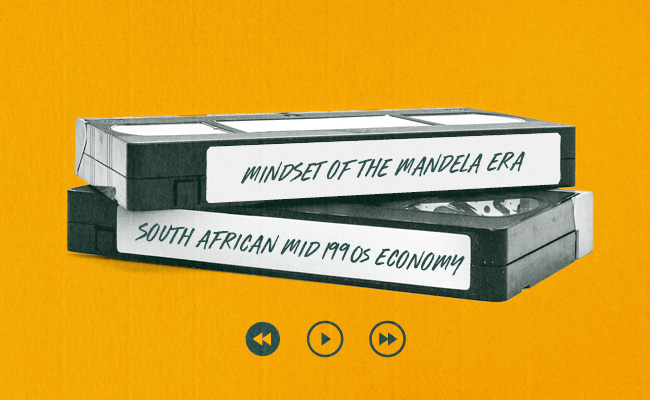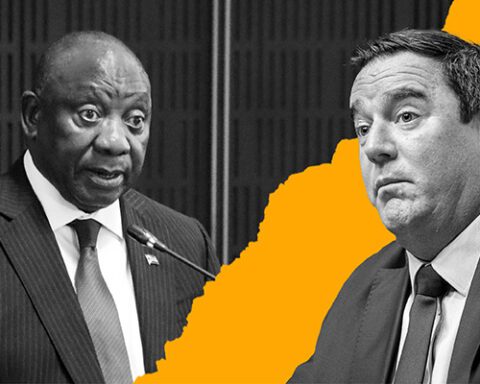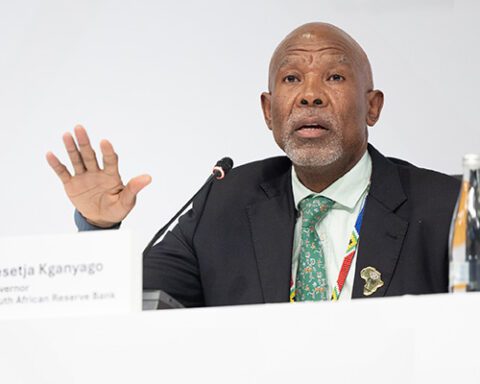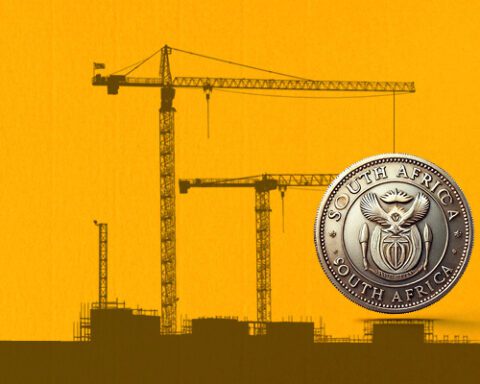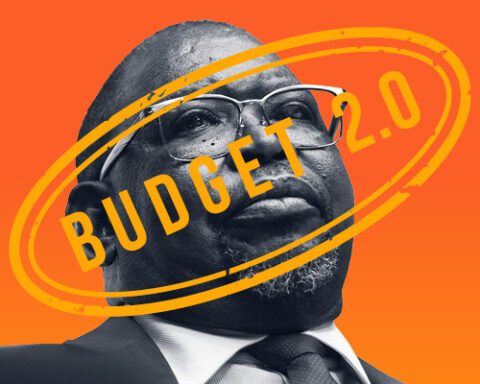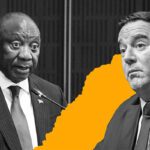Economist Iraj Abedian remembers being in the kitchen as part of the team crafting a new economic plan under Nelson Mandela’s presidency. The young democracy was facing many of the same problems South Africa confronts today: high debt costs, low growth and fiscal disarray.
The difference? South Africa had then what it sorely lacks now: sacrificial leadership, urgency, unity of purpose, a willingness to learn, political will – and the world’s backing. It also had credibility, even though the ANC had never been in government – and it hadn’t yet been infected by the corruption that now dominates both the party and the state.
This shows in today’s stubbornly high unemployment rate of 41.9%, a figure that includes those who have given up looking for work, and an economy that has grown by less than 1% per year over the past decade. Citizens are measurably worse off: GDP per capita has shrunk 17% since 2010 in dollar terms.
Abedian likens South Africa to a stage-three cancer patient being treated with painkillers. As symptoms worsen, the painkillers get stronger – but the illness progresses. Unless political leaders acknowledge the severity of the crisis and urgently implement structural reforms, the country risks slipping into a full-blown debt trap, with its “economic cancer” rapidly advancing to stage four.
“The real problem is that we have socialised and structurally condemned this economy to what is technically, in the language of economists, called low-growth equilibrium or no-growth equilibrium,” says Abedian, the founder and CEO of Pan-African Investment and Research Services. A low-growth equilibrium is when an economy settles into a pace below its potential – and can’t break free.
When he talks about becoming “socialised”, Abedian means that we’ve grown so accustomed to weak growth that 2% now looks promising – when for an economy like ours, it isn’t nearly good enough. To attract investment and tackle poverty and unemployment, GDP growth needs to accelerate to no less than 3%.
“You need to have what is called a ‘comprehensive, integrated shock’ to the economy,” he says. “I’m using ‘shock’ not in a negative sense, but in a positive sense.”
It may hurt
Leaders must be prepared to do such things as redesign state-owned enterprises and change the budgeting approach – but, he warns, they “must first sit in a room and say: ‘This patient needs the following protocol of medical treatment.’”
“They’re going to be painful, they’re going to be consequential, they’re going to be hurtful, and yet there is no other option,” Abedian says. “The game has to change to the point that the citizens believe it has changed, and the business sector.”
It’ll take 24 to 36 months just to turn it around, he reckons.
Among his proposals, he suggests:
Fixing infrastructure bottlenecks through concessions
South Africa’s ports, rail and water systems are decades behind other nations. The state lacks the capital, skills and expertise to fix them alone. Rather than defaulting to full privatisation, the government should implement well-structured, global-style concessions to bring in capable private partners and address these critical chokepoints.
Addressing dysfunctional cities using constitutional powers
The worst-performing metros should be placed under a state of emergency using constitutional provisions. Local governments must be replaced with small teams of competent technocrats – local or international – who are given five-year mandates to deliver turnarounds. Coalition politics and political appointments have failed residents and derailed service delivery.
Slashing the cost of government
Ministers and their offices have become bloated and unsustainable. Half of the perks in the ministerial handbook should be cut. There is no justification for drivers, bodyguards and excessive personal staff in a low-growth economy. Ministers should drive themselves – just like teachers, nurses, and CEOs do. The savings of up to R1.5bn from this could be redirected toward rebuilding the economy.
Shifting political culture and mindsets
Leadership roles must attract those who want to serve, not those seeking perks. The culture of entitlement – more suited to colonial-era practices – must end. Public office should be about sacrifice, discipline and national service. Without a change in political morality, even well-designed policies will fail to take root.
‘A champion of fiscal prudence’
Under Mandela’s presidency, Abedian co-ordinated what became South Africa’s Growth, Employment and Redistribution (Gear) policy, introduced in 1996. “We had some favourable factors. We had the Mandela factor. We had [Thabo] Mbeki as deputy president, who understood economics,” he says, a trait few politicians share today.
He worked alongside a team including Trevor Manuel (former finance minister), the late Tito Mboweni (former Reserve Bank governor and finance minister), Alec Erwin (former minister of public enterprises), Jeff Radebe (former minister in the presidency), Gill Marcus (ex-governor of the Reserve Bank), Chris Liebenberg (former minister of finance) and others, debating, drafting and refining Gear through the night.
They even discussed separating the South African Revenue Services from the finance ministry and giving it autonomy – a move that eventually resulted in improved tax collections and global acclaim for the institution under the late Pravin Gordhan.
None of the team were paid, and some had to fund themselves. Their motivation came from a shared vision of building a sustainable economy for the new South Africa.
They were intellectually rigorous, willing to challenge one another, and open to learning from economic experts despite their ideological differences. “And possibly, the shining example of that was Trevor Manuel,” Abedian says. “He came from the left of the left wing, moved toward the left of centre, and became the champion of fiscal prudence.”
It took them three weeks to pull together Gear, after which Abedian had to convince sceptical business leaders that the economy would recover.
They only believed him once the policy began to deliver: growth averaged 3.6% per year from 1996 to 2008, inflation slowed and fiscal discipline improved. Investment and private sector confidence returned. Under Manuel, the government moved from a 5% budget deficit to a 1.5% surplus by 2007.
For Abedian, the calibre of leadership was key. “It wasn’t as if we were smart. You could put the smartest plan together, but if Mandela and Mbeki weren’t there, if Trevor Manuel wasn’t as honest, if he wasn’t as intellectually robust as he was … we had a good recipe, but in the hands of a poor chef, it [could have] become a mess.”
Gear had its critics for being too market-driven and private sector-led, and it was replaced in 2006 by the Accelerated and Shared Growth Initiative for South Africa, which took a more interventionist, government-driven approach.
Growth subsequently slumped, hit by the 2008 global financial crisis. Debt-to-GDP levels surged. Finance costs became the second-largest item in the national budget, and borrowing costs rose to about 21% – roughly the same level as in 1996. Under president Jacob Zuma, institutions were hollowed out and corruption flourished.
The bitter fruit of that era is the high finance costs we now bear, which are killing the economy, says Abedian.
“The minute you acknowledge the real issue, you stop misleading the nation,” he adds. “I have not heard any authority – be it the minister of finance or the president – come forward and say:
“‘Fellow citizens, we have a stage-three cancer. We are reaching beyond the fiscal cliff. Painful as certain measures will be, we have left them too long. We didn’t listen to the right people. We bludgeoned them. We kicked them out of the cabinet. We silenced the National Treasury. We ignored the ratings agencies. Instead, we took painkillers – borrowing, borrowing, borrowing. Now, we’ve run out of tools. There is nothing left.’”
There is a lot to miss about the 1990s. Grunge and flannel shirts are standouts for this author (thankfully, Pearl Jam is still around). For this economy, it’s very much the spirit of thought and sacrifice for the greater good of that era. If only we could rewind and reset.
Sign up to Currency’s weekly newsletters to receive your own bulletin of weekday news and weekend treats. Register here.
